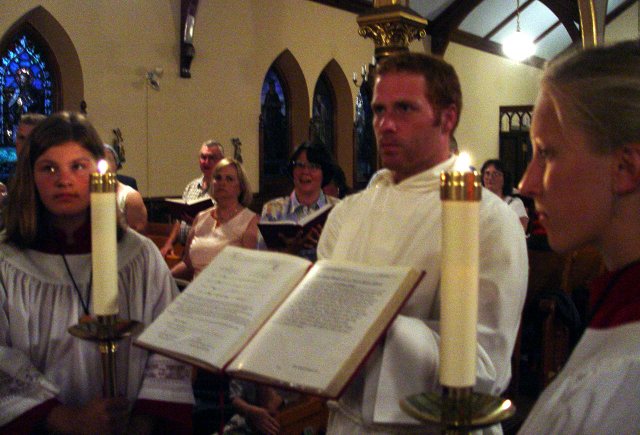Presbyterianism, that is.
Bill Smith a good on-line friend is kicking up a little dust of late against Reformed Protestantism or Presbyterianism and maybe a tad triumphal about his own communion (Reformed Episcopal Church) which, the last I checked, was where you still needed to kneel in order to receive grape juice – ba dop bop.
It’s time for pushback.
First, he starts with a legitimate complaint about Presbyterian worship and blames the regulative principle:
Across the PCA you can find strict regulative principle worship (few), traditional worship, contemporary worship, black worship, near charismatic worship, blues worship, revivalistic worship complete with the invitation system, gospel-driven worship, and all sorts of blended worship. You can find ministers leading worship in black Geneva gowns, suits with white shirts and ties, blazers and open collar shirts, polo shirts and sandals, khakis or jeans and sports shirts tucked in or out standing behind pulpits, sitting on stools, walking across and an empty stage. You can find pulpits, baptismal fonts, and communion tables prominently displayed, or entirely hidden. You can sing Psalms and historic hymns, gospel hymns, praise and worship songs, accompanied by nothing, organs, pianos, orchestras, acoustic guitars, and rock bands. Depending on your worship principles, preferences, and personality, you can find the worship in a PCA church comfortable, compatible, challenging, relevant, irrelevant, or offensive.
All of this is true. But you can’t fault the regulative principle which only identifies the elements (as opposed to circumstances and forms) of worship. Those are word, sacrament, prayer (song), and offering (never forget to collect the offering). The RPW does not guarantee uniformity in congregations. It should exclude silliness and frivolity. But if you have officers who are willing to tart worship up to make it relevant, convincing them of the RPW won’t solve anything.
Conversely, rule by one (episcopacy) is fairly effective in generating liturgical conformity. But then there’s Rome. Doh!
Second, he moves to the tragic death of Iain and the allegations swirling around it to argue that Presbyterian government doesn’t work very well. I actually wish Bill had not gone here. It’s still fresh and details are uncertain. But there he went. And his point is that harsh forms of discipline is what Presbyterians are good at:
it also set me thinking again, as I often have, about the way discipline of ministers was handled in my former connection. And it impresses me that it was handled in the way a particular kind of father might deal with his son. The son took the family car out on a Friday night without permission. The father becomes aware of what the son did because (1) the son confessed it, (2) someone who witnessed the son with the family car told the father, or (3) the father himself discovered it.
What does this particular type of father do? (1) He takes away the son’s keys and intends to return them (a) never or (b) after observing his son’s repentance for a long time. (2) He beats the hell out of the son. (3) He requires the son to confess his disobedience and avow his repentance at a council of the whole family.
Now the father may cry. He may even cry with the leaders of his church. He may pour out his heart to God about how he has gone wrong in the bringing up of his son. He may ask others to pray for him and his son. He may tell his son he loves him and that his heart is broken. Still, he takes the keys away forever or an indeterminate time. Still he beats the hell out of the kid. Still he requires the son to humiliate himself before his family.
Does Bill think that the threat of draconian measures were what drove pastor Campbell? Perhaps, but the analogy of a son taking out dad’s car without permission is not necessarily on the same order of a man who has taken vows to a wife and — wait for it — a church (can we get a little high church Reformed Episcopalianism here?). And what is Father Bill going to say to the wife of a man who has cheated on her or abused her? Has Bill Smith had to face down Valerie Hobbs?
Finally, Bill goes all in and defends Lent against its Reformed Protestant critics (“war”? On-line?). He notes that Banner of Truth once had to rearrange a conference because the Dutch Calvinist participants needed to hold Ascension services. He concludes:
Those who object to Ash Wednesday and Lent on principial grounds should recognize that that what they object to on principial grounds is the Christian year. For those who do not reject the Christian year, but allow for the observance of some parts of it, the issue of Lent is one of preference and discretion.
No problem. I’ve been arguing against the church calendar for years. The inter-advental liturgical calendar is 52 Sundays a year.
But at least, Bill still has a Presbyterian attitude.



